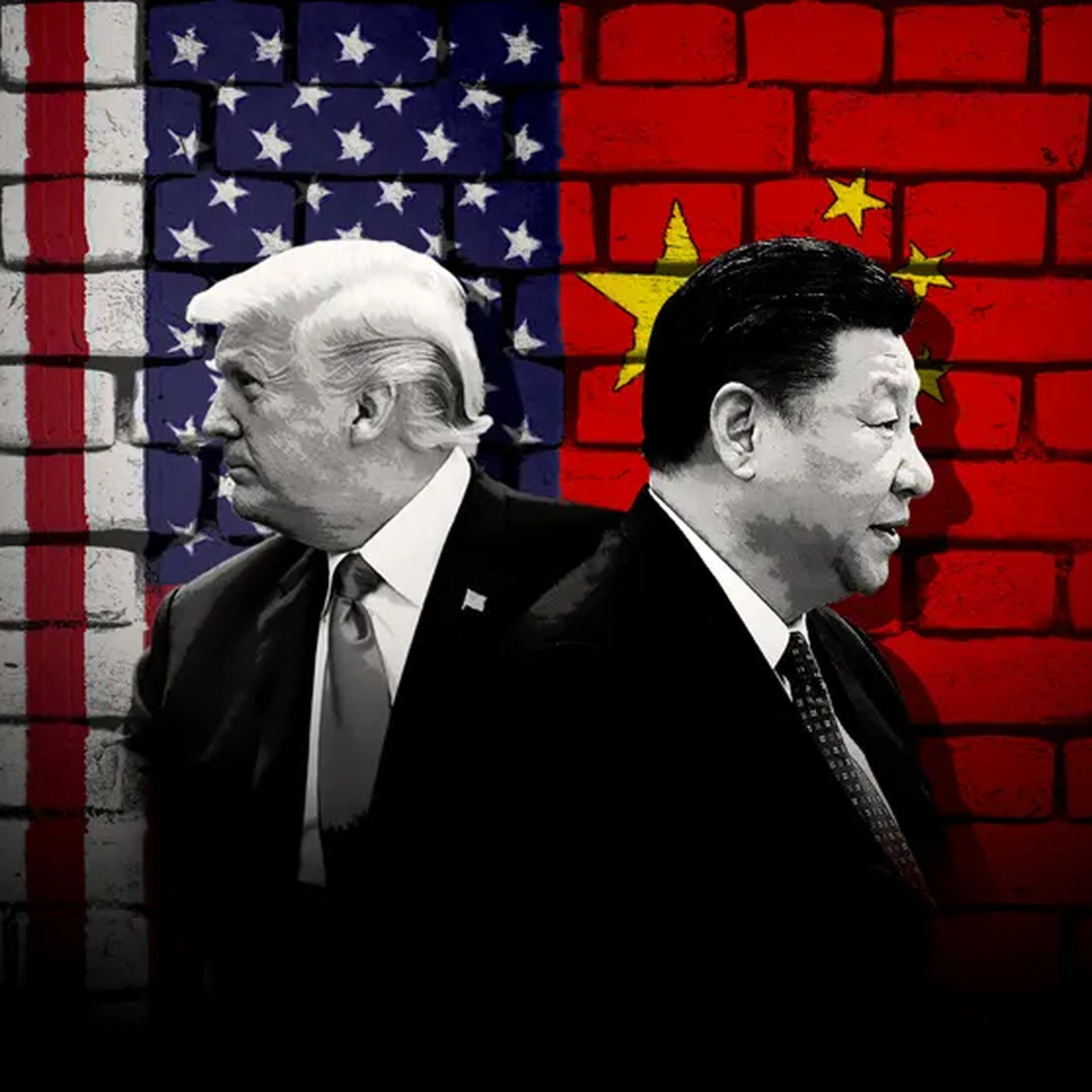
Here's Why China's Trade War Strategy Is Working

Here's Why
Deep Dive
- China's unexpected firm stance against US tariffs.
- Beijing's tit-for-tat response surprised analysts.
- Xi Jinping's refusal to back down.
Shownotes Transcript
This is an iHeart Podcast. Thrivent can help you plan your finances for the people, causes, and community you love. What makes Thrivent different? Financial services and generosity programs are combined to help you build a financial roadmap for the future, while also creating opportunities to give back along the way. Visit Thrivent.com to learn more.
Thrivent, where money means more.
Bloomberg Audio Studios. Podcasts. Radio. News. I'm Stephen Carroll and this is Here's Why, where we take one news story and explain it in just a few minutes with our experts here at Bloomberg. What a difference a few weeks can make. This was on the 10th of April. Well, we'll see what happens with China. They've really taken advantage of our country for a long period of time. They've ripped us off.
how people stood for it, sitting in my position is not even believable. Fast forward just over a month to the 12th of May. We achieved a total reset with China after productive talks in Geneva.
Both sides now agreed to reduce the tariffs imposed. The relationship is very, very good. I'll speak to President Xi maybe at the end of the week. After weeks of escalation, the United States and China agreed to a 90-day truce, slashing tariffs on each other's goods that had spiralled to over 100%. The Chinese president has struck a defiant tone ever since Trump began raising US tariffs to their highest level in a century.
In contrast to other world leaders, Xi Jinping has refused Trump's repeated calls to get on the phone with him. And speaking the day after the deal was announced, he wasn't toning down his message. There are no winners in tariff wars or trade wars. Bullying or hegemonism only leads to self-isolation. So here's why China's trade war strategy is working.
Bloomberg opinion columnist Karishma Vaswani joins me now for more. Karishma, how would you characterise the approach that Xi Jinping has taken to Donald Trump since his return to the White House? I think it's been tough. I think it's been unflinching. I think we've seen a lot of nationalist rhetoric out of both governments, but in particular from China when the trade tariffs were first announced.
We saw sort of tit for tat action from Beijing in a way that at the time, most political analysts and economic analysts had sort of said, oh, that won't happen because China can't afford the economic hit.
consistently trying to match the tariffs on the American side. Instead of a sort of more conciliatory approach, we did see a very firm stance from Xi Jinping and Chinese officials. And I think that's paid off because I think what that's shown the Americans is that the Chinese were not
going to back down and we're not going to come to the negotiating table just because there had been tariffs slapped on them by the US. When things were escalating rapidly in April, you quite presciently wrote that the Chinese president wouldn't blink first in the trade war. What led you to that conclusion?
I think that China, in some respects, has as much, if not more, to lose when it comes to political legitimacy and credibility with its own people. Both leaders are playing to their domestic audiences, right? So in China, on the one hand, you have a political system where the Chinese Communist Party doesn't need to win elections like the Republicans do. So even with economic pain that was foreshadowed as a result of the trade tariffs,
they could galvanize and mobilize their people and citizens there and sort of consistently hammer on that narrative that the U.S. is trying to keep China down. It's a really effective narrative and it's been used before. But I think the other reason why I felt at the time that the Chinese wouldn't blink first is because they see this as part of a sort of historical art.
which is that it's China's moment to rise while the West is in decline. And that's something we've heard consistently from Chinese officials time and time again, not just with regards to the trade war, but other aspects of the geopolitical squabble between the two sides. And I think had they backed down first...
it would have been counterproductive to that narrative. We've seen measures on the Chinese side to address prolonged economic issues in a way to sort of prepare for the impact of the trade war. I'm not saying that there aren't real issues at play here, but I think that China's more willing to sort of
suffer the long-term economic costs in order to achieve political goals. But does that approach, Krishma, have limits? Is there a place where the risk to the Chinese economy could be too great if this strategy is pursued long-term? Well, indeed. And I think the outcome of the weekend's discussions will be seen as productive on both sides.
And it's something that the Chinese definitely wanted as well. And the fact that it happened in a sort of neutral place, they could save face. You know, they're not going to the United States in any way. Now you also have comments from U.S. officials saying we don't necessarily want a decoupling. That's a huge win for the Chinese because that's something they've kept saying from the start.
And throughout this entire trade war during the Trump administration, this one and the previous Trump administration, when, you know, arguably all of these tensions first began, the Chinese have consistently said that they are the champions and upholders of the multilateral rules based order. And given the fact that, you know, Trump is.
imposed these tariffs, not just on the Chinese, but on other countries as well. That's a really easy argument to believe in. I mean, I've spoken to lots of Asian diplomats, you know, in the past couple of weeks. And there's a real degree of bewilderment, Stephen, about why the Trump administration would go after
all countries and not necessarily just target China the way that we have seen in the Biden administration. So Beijing has been able to win and score rather, I should say, political points with its neighbors as well, not just trying to create that narrative back at home.
Should we expect a shift in tone? Because neither the US nor China have been particularly nice about each other over the past couple of weeks and months. But now that we're into a further negotiation phase when this pause is in place, should we expect the tone of those comments to change?
I think you will see some of that. A lot depends on what happens in the next 90 days. You know, there is some speculation that these tariffs will just keep getting postponed. And that allows the Trump administration to say they're consistently talking and trying to get to some conclusions.
type of deal or negotiation. But, you know, tariffs are higher than they were when before Trump became president. So that is something that will definitely have an impact. I think going forward as well, there are going to be key issues that you will see as part of the negotiations become factors in whether this deal unravels or not. One of the things I'm quite focused on in the next couple of days is
is the fentanyl agreement or, you know, what that actually means because there are still tariffs attached to the negotiations on fentanyl tariffs that I think the Chinese would like to see removed. But, you know,
Beijing consistently says that it is not to blame for the U.S. drug epidemic, that it's done as much as it can, and it feels that the U.S. needs to address this problem at home. On the American side, they see this as another way that the Chinese are sort of using what they have in terms of, you know, not clamping down on Chinese chemical companies that are
using back doorways to get into the US via Mexico and selling drugs that they believe are killing, which are killing, thousands of Americans. So that's one thing I think that will become a key focus going forward in the trade talks. Are there lessons to be learned from the trade talks?
for other countries on how to handle Donald Trump from the way that China has approached this? Could anyone else pull this off? Not in Asia. Nobody has the might and scale of the Chinese economy. Nobody has the ability to politically or economically withstand these tariffs the way that the Chinese do.
And I think you've already seen that with the flurry of meetings and politicians wanting to meet with Donald Trump and negotiate in some way these trade negotiations. And from India to Japan to South Korea, all of these countries have, to some extent, been lining up to try and get a better deal. And I think that is...
is the harsh reality of geopolitics and the way economies work. The Chinese can do this, but not anybody else. OK, Karishma Vaswani, Bloomberg Opinion columnist, thank you very much for joining us. And you can read Karishma's latest work at Bloomberg.com slash opinion. For more explanations like this from our team of 3000 journalists and analysts around the world, go to Bloomberg.com slash explainers.
I'm Stephen Carroll. This is Here's Why. I'll be back next week with more. Thanks for listening.
This is an iHeart Podcast.